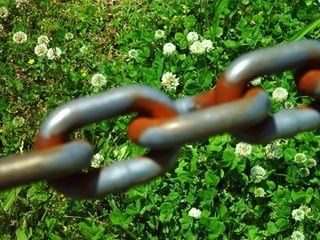
When we begin, we’re all living in a garden overgrown with weeds and littered with broken glass. We are weak because our roots are only centimeters long. Our stems are pale and spindly and grafting is essential. We need it to survive.
Psychologically, this can be seen in the fact that we are all bent toward addiction. We lean toward it like sunflowers. We are weak plants with addictive tendencies. We peer around the garden, looking for a root system that seems like it could feed an extra stem.
We’re Venus Fly Traps and we keep our eyes open.
At the same time, we display emotional sophistication that few plants possess. We find various ways to cope with the fact that we will never develop root systems of our own. For some, this involves pretending that they are plants-with-roots. I’m fine! I’m fully hydrated, self-contained and self-sustaining. For others, it means acting like Who cares, no one needs roots anyway. Our grafted-ness stays hidden because our culture promotes it. We hide our missing roots because no one should be this needy.
But all the time, we are making psychological grafts onto root systems that look promising. Maybe it’s a controlling hunger for intimacy, for approval, for recognition. Or the more overt addictions: drugs, alcoholism, sex. Usually a designer combination. We think these things can fuel us.
Even in apparently well-cultivated lives, addictions spring up. We need a driving purpose for living like stems need water. Roots give direction, and our addictions keep us grounded. The problem is, the addictions are also cannibalistic. Clinging to them is the status quo, but we fail to realize they are feeding off of us.
Fortunately, there is a theological side to the grafting metaphor as well: We are weak plants with a need for total dependence which gives life. But there is only one root system that offers such a drink. Only one source inverts the normal process of addiction, and lets us feed off him.
He does it because there is no danger of him running out. In fact, when we absorb his water and nutrients, they outlast the stems through which they flow. This taproot, paradoxically, transcends the stems it serves. When consumed, it subsumes. It stirs soul after soul to life, and remains consummately alive.
“I am the vine, you are the branches,” says Jesus. “The one who dwells in me will bear much fruit; apart from me, you can do nothing” (John 15:5). Christ is the supreme inverter of a fallen garden. He is a healing addiction. He feeds us without leeching. He turns things upside down.
Some stems discover they possess not only instincts, but spirits, and welcome a graft to Jesus with no-longer-wandering eyes. The old loyalties may not change overnight. Other roots still wait in the shadows, but slowly something new is happening. Maybe new branches are emerging skyward; maybe there is a gathering of strength; maybe our old addictions slowly become mere foliage—still present, no longer dominant. At the very least, there is a new resiliency. The old cultural propensity to disguise our hunger is fading and we are growing honest.
Christ calls all this “abiding.” Fruit may be slow to come, but we don’t strain after it. We are not about to start tying cornucopias to our branches. We are learning that it is simply good to grow in Christ’s life, no longer concealing our design. We have no roots—OK. We’re grafted and we don’t deny it. We have better things to do.
For example, we are learning to take long drinks. Slowly, small pieces of Christ’s kingdom are being infused into our veins. These are the shining nutrients, tiny and unspeakably heavy, that will transform our lives. If we could only see them, winding through woody passages, we would be astonished to see them glowing with a heavenly fire—they are one, and they are alive.
We come to see that we will never have roots ourselves, but that we will emerge eventually into a cool, bright garden. There will be dappled light and cloudbursts, and sighing breezes that make leaves dance. Then at last we will be unthinkably dependent and unimaginably alive.
This new garden will be a little like the very first garden God made. Only better, because there will be no shriveling.
::
Inspired by a lecture by Dr. Paul Carlisle, 4.20.2006.
Sunday, April 23, 2006
Garden of Eden Redux
Posted by
AJ
at
9:17 PM
3
comments
![]()










3 comments:
I think the definition of "well" should be your blog.
You're deep.
This new garden will be a little like the very first garden God made. Only better, because there will be no shriveling.
Beautiful. Not only because of no shriveling, but because those of us who will be in that new garden will have chosen to be there, too. We will have chosen to come home/
Outstanding...Jesus the Great Gardner!
Post a Comment